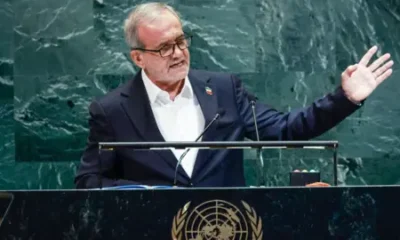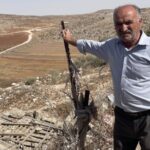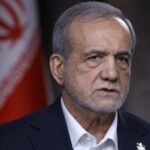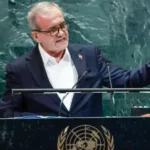Other News
Anti-war: Germany’s new peace movement gains momentum
Read more on post.
Major anti-war protests are planned in Germany for the next couple of weeks.
More than 10,000 people gathered in front of the world-famous Brandenburg Gate in Berlin already on September 13 under the rallying cry, “Stop the genocide in Gaza.”
Russia’s unlawful war against Ukraine also brought people out to the demonstration.
The most prominent speaker present was politician Sahra Wagenknecht, one of the organizers of the demonstration and the founder of the political party, the economically left-wing, politically conservative Sahra Wagenknecht Alliance.
Many well-known artists also took to the stage, including actor Dieter Hallervorden, musician Peter Maffay, and rappers Massiv and Bausa.
The very diverse group was united in its clear message to the federal government: “Provide active and meaningful support for peace negotiations in both the Middle East and Ukraine.”
Demonstrators also called for all arms deliveries to war zones to be stopped.
“We are all here because we are raising our voices against the inhumane wars in this world,” said Wagenknecht. “We also condemn the terrible massacre carried out by Hamas and the hostage-taking.”
But none of this justifies “indiscriminately bombing, murdering, starving, and displacing two million people in the Gaza Strip, half of whom are children,” said the politician.
For peace negotiations, against arms deliveries
Could this be the start of a new peace movement capable of mobilizing the masses?
German history offers many possible parallels: like in the 1980s, when the fear of nuclear war drew half a million protesters to Hofgarten Park in Bonn, in the western part of what was then still a divided Germany.
Or in 2003, when crowds just as large took to the streets of Berlin to protest against the Iraq War.
Jannis Grimm believes that there is the possibility of a new, powerful movement, but thinks it is unlikely at the moment.
Grimm is a peace and conflict researcher at the Free University of Berlin and is currently watching the emergence of many very different initiatives and alliances.
However, he said in an interview with DW, they still lack a shared goal.
“This is in contrast to what was happening during the mobilization against the Iraq War, for example, or even during the peace movement before then. At the moment, it’s still relatively fragmented. But that doesn’t mean it can’t develop further,” says Grimm.
Sahra Wagenknecht is the most prominent and most controversial figure of the movement.
In 2023, one year after the start of the war in Ukraine, she organized a rally together with women’s rights activist Alice Schwarzer.
Critics accused the two of being too sympathetic to Russia or even to President Vladimir Putin.
This time around, Wagenknecht’s rally is once again attracting criticism.
Josef Schuster, president of the Central Council of Jews in Germany, has accused her of fueling “hatred of Israel in Germany” with her “rather populist stance.”
Jan van Aken, co-chairman of the socialist Left Party, did not go that far, but he did criticize the demonstration in an interview with DW: “I believe that political work must involve as many people as possible. And for me, simply focusing on a few names is not political work.”
At their demo in Berlin on September 27, Van Aken and his party hope to do things differently and, in his view, better: “We have formed an alliance with non-governmental organizations and Palestinian organizations. We have to bring everyone together: critical Israelis, Jewish Israelis.”
The debate on compulsory military service mobilizes young people
Whether this approach will be successful is something the Left Party leader himself is eager to find out.
As he says himself, he is a child of the 1980s peace movement. But he does believe there is one issue that could mobilize a large number of people: compulsory military service.
“This could be a big issue because it directly affects many young people, who might take to the streets to protest against it.”
If the protest spills over from the internet onto the streets, Van Aken’s optimism could be justified.
There is currently an online petition circulating on the internet that was started by a young man: “No compulsory military service without a say for young people!”
As of September 26, more than 70,000 people have already signed the petition.
‘Germany is a thoroughly pacifist country’
The Left Party sees the debate on compulsory military service as a key issue.
“This is a real delicate issue, and it will determine the future of militarism in Germany,” says party leader van Aken. Over the past 40 years, he says, Germany has always managed to keep it at bay. “Germany is a thoroughly pacifist country. But at the moment, the tide is turning,” he fears.
Peace and conflict researcher Jannis Grimm also believes that it is possible that protests against militarization and especially against a return to compulsory military service will grow more popular.
At present, the left-wing scene is highly fragmented. The most active groups are the Left Party and the alliance founded by Sahra Wagenknecht (BSW), which formed after splitting from the Left Party.
“This has created a situation where there is no single party that clearly overlaps with the movement on the streets,” says protest researcher Grimm.
Nevertheless, resistance is clearly growing, and it could reach a high point on October 3.
As the date commemorating the reunification of Germany, it is a highly symbolic day. Large demonstrations will be held simultaneously in Berlin and Stuttgart.
Over 400 initiatives, organizations, and parties have joined the call. The slogan: “Never again ready for war! Let’s stand up for peace!”
This article was originally written in German.
While you’re here: Every Tuesday, DW editors round up what is happening in German politics and society. You can sign up here for the weekly email newsletter, Berlin Briefing.
Other News
UN Security Council rejects Russian-Chinese resolution to delay ‘snapback’ sanctions on Iran
Read more on post.

ADVERTISEMENT
The UN Security Council rejected a last-ditch Chinese and Russian effort to delay reimposing sanctions on Iran over its nuclear programme. Iranian President Masoud Pezeshkian called the decision “unfair, unjust and illegal” immediately after its announcement.
The resolution, tabled by Moscow and Beijing, who are Iran’s closest allies among the 15-member council failed to garner support from the nine countries required to bring the series of UN planned sanctions – set to take place on Saturday – to a halt.
The vote ended with four votes in favour of the resolution, nine votes against, with two abstentions.
“We had hoped that European colleagues and the US would think twice, and they would opt for the path of diplomacy and dialogue instead of their clumsy blackmail, which merely results in escalation of the situation in the region,” said Dmitry Polyanskiy, Deputy Russian Ambassador to the UN.
Pezeshkian, speaking to journalists and Iran experts on the sidelines of the UN General Assembly shortly after the vote, said that despite previous threats, Iran won’t withdraw from the Nuclear Non-proliferation Treaty like North Korea, which abandoned the treaty in 2003 and then built atomic weapons.
Barring a last-minute deal, the sanctions — triggered by the UK, France and Germany — will once again freeze Iranian assets abroad, halt arms deals with Tehran and penalise any development of Iran’s ballistic missile programme.
The sanctions are designed to further squeeze the country’s reeling economy and aim to pressure Iran towards the negotiating table. The move is expected to heighten already magnified tensions between Iran and the West.
Four countries — China, Russia, Pakistan and Algeria — once again supported giving Iran more time to negotiate with the European countries, the so-called E3, and Washington, which unilaterally withdrew from the international accord in 2018 during US President Donald Trump’s first administration.
“The US has betrayed diplomacy, but it is the E3 which have buried it,” said Iran’s Foreign Minister Abbas Araghchi after the vote. “This sordid mess did not come about overnight. Both the E3 and the US have consistently misrepresented Iran’s peaceful nuclear programme.”
The European leaders triggered the so-called “snapback” mechanism last month after accusing Tehran of failing to comply with the conditions of the accord and when weeks of high-level negotiations failed to reach a diplomatic resolution.
Since the 30-day clock began, Araghchi, has been meeting with his French, British and German counterparts to strike a last-minute deal, leading up to this week’s UN General Assembly High-level week.
But those talks appeared futile, with one European diplomat telling the Associated Press on Wednesday that they “did not produce any new developments, any new results.”
Pezeshkian painted a different image of how the meetings went, saying that it was the Europeans and Americans who refused to make a deal during the High-level week.
“Every time we spoke with the Europeans, we’ve reached conclusions and agreements, but then at the end of the day the American side did not accept,” he said.
As for direct US-Iran talks, one night this week “our foreign minister and European foreign ministers were supposed to sit together and reach an agreement, but the Americans never showed up,” he said. “What are we supposed to do?”
Of all the nations in the world that don’t have nuclear weapons programme, Iran is the only nation in the world that enriches uranium up to 60% — a short, technical step from weapons-grade levels.
Earlier this month, the UN nuclear watchdog signed an agreement with Tehran – mediated by Egypt – to pave the way for resuming cooperation, including on ways of relaunching inspections of Iran’s nuclear facilities.
However, Iran has threatened to terminate that agreement and cut all cooperation with the IAEA should UN sanctions be reimposed.
A diplomat close to the IAEA confirmed on Friday that inspectors are currently in Iran where they are inspecting a second undamaged site, and will not leave the country ahead of the expected reimposition of sanctions this weekend.
Other News
Autism campaigner: Autism is not new and does not need to be cured
Other News
‘People forget the Steelers were here before’: Reporter back in Dublin 28 years on for NFL game
-
Politics4 days ago
European Parliament snubs Orbán with vote to shield Italian MEP from Hungarian arrest
-
Culture3 weeks ago
Life, loss, fame & family – the IFI Documentary Festival in focus
-
Culture2 months ago
Fatal, flashy and indecent – the movies of Adrian Lyne revisited
-
Environment1 week ago
Key oceans treaty crosses threshold to come into force
-
Health5 days ago
EU renews support for WHO’s Universal Health Coverage Partnership
-
Culture4 days ago
Twilight at 20: the many afterlives of Stephenie Meyer’s vampires
-
Culture1 week ago
Farewell, Sundance – how Robert Redford changed cinema forever
-
Culture4 weeks ago
What is KPop Demon Hunters, and why is everyone talking about it?










































